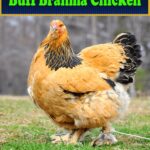Silkie Roo vs Hen: Understanding the Differences and Benefits
The unusual appearance and docile temperament of the Silkie chicken make it an increasingly common option among backyard poultry aficionados.
However, a comparison between silkie roo vs hen can be challenging. Here, we’ll talk about how raising silkie roos and hens can benefit your flock as a whole, as well as their individual traits and habits. Let’s dive in and find out all there is to know about roos and hens when it comes to silkies.
Silkie Roo vs Hen: What Sets Them Apart?
The silkie chicken breed includes both roosters and hens. They are easily distinguished from one another despite their same features.
Physical Appearance
Silkie roo vs hen exhibit distinguishing physical features:
Silkie Roo
-
- Size: In comparison to hens, roosters tend to be somewhat larger. They have a potential height/weight range of 10-12 inches and 1-2 pounds, respectively.
- Comb and Wattles: The combs and wattles of roosters are larger and more pronounced than those of hens. Their combs and wattles tend to be vibrant red.
- Crest: The crest on a rooster is usually larger and more prominent than that of a hen. The crest is a plumed bun on top of their head.
- Plumage: Elegant and stately, roosters are easily recognizable by the long, pointed saddle plumage and hackle hairs that drape gracefully down their necks.
- Spurs: Spurs appear on the legs of adult roosters but not hens. Spurs are bony projections that aid in self-defense and assertiveness.
Silkie Hen
-
- Size: Hens are noticeably smaller than chickens, with an average height and weight of just 8-10 inches and 1.5-2 pounds respectively.
- Comb and Wattles: Hens’ combs and wattles are also smaller and less prominent. Pink coloring can be seen in their combs.
- Crest: Hens also possess a crest, but it is smaller and less elaborate compared to roosters.
- Plumage: Hens have shorter and rounded feathers on their bodies, giving them a fluffy appearance.
- Spurs: Hens do not develop spurs.
Behavioral Differences
Apart from their physical attributes, silkie roo vs hen also exhibit distinct behaviors:
Silkie Roo
-
- Crow: The crow of the rooster is instantly recognizable. To proclaim their territory and draw in mates, they make a distinctive and lilting crow.
- Protective Nature: Roosters have a stronger instinct to guard their chicks. They keep a sharp lookout for predators and crows to warn the hens.
- Aggression: When maintaining dominance or defending their hens, roosters may resort to aggressive behavior toward other roosters.
- Mating Behavior: Tidbitting is the rooster’s courtship dance to entice the hens for mating. They also help the chickens produce fertile eggs.
Silkie Hen
-
- Broodiness: The maternal instinct in hens is very strong. It’s possible they’ll do things like sit on eggs to help them hatch or take in strays.
- Nesting: Hens are careful about where they lay their eggs and are skilled nest builders.
- Clucking: When hens want to call their chicks or announce the discovery of a nice food, they make a quiet clucking sound.
- Egg Laying: Chickens, or hens, are the birds that produce eggs. Depending on characteristics including age and health, they can lay an average of three to four eggs every week.
Silkie Roo vs Hen
Benefits of Keeping Silkie Roos and Hens
Both silkie roos and hens offer unique benefits when kept as part of your flock. Let’s explore the advantages of having them:
Silkie Roos
-
- Flock Protection: The rooster is a crucial member of the flock’s defense team. Their attentive demeanor and awareness can help keep your chickens secure.
- Natural Hatching: In order to successfully breed silkie chicks, a rooster is required. In order for eggs to develop into chicks, roosters are essential because they promote natural fertilization.
- Beauty and Elegance: Roosters are a great addition to any flock because of their beautiful plumage and impressive crests.
Silkie Hens
-
- Egg Production: Hens are dependable egg layers, so you never have to worry about running out. Silkie eggs may be smaller, but the velvety yolks make up for it.
- Broodiness and Adoption: The broody nature of silkie hens makes them great parents. They can incubate and rear their own babies or even accept and care for other chicks.
- Docile and Friendly: The gentle and loving nature of Silkie hens makes them a great choice for households with kids.
FAQs About Silkie Roo vs Hen
Can silkie hens lay eggs without a rooster?
Yes, silkie hens can lay eggs without a rooster. However, these eggs will not be fertilized and will not develop into chicks.
Are silkie roosters aggressive toward humans?
If raised with humans from an early age, Silkie roosters are likely to be friendly and tame. Some roosters, though, may show aggressive behavior if they perceive a threat.
Do silkie hens go broody more often compared to other chicken breeds?
It’s true that silkie chickens are more likely to go broody than other chicken breeds. Because of this, they are capable of being both terrific mothers and potential foster mothers.
Can silkie roosters be kept together in the same flock?
Having more than one silkie rooster in a flock can lead to aggressive behavior and fights for control, so it’s best to keep them separate. Only one rooster per flock is recommended.
Conclusion
In conclusion, each true poultry fanatic must know the distinctions between silkie roo vs hen. While silkie roosters are known for their flashy plumage and protective nature, silkie hens are superior layers of eggs and attentive mothers.
Having roosters and hens in your flock allows you to take advantage of both types of birds. Silkie chickens are a great addition to any backyard flock, whether you’re looking for an elegant rooster or a productive hen.





